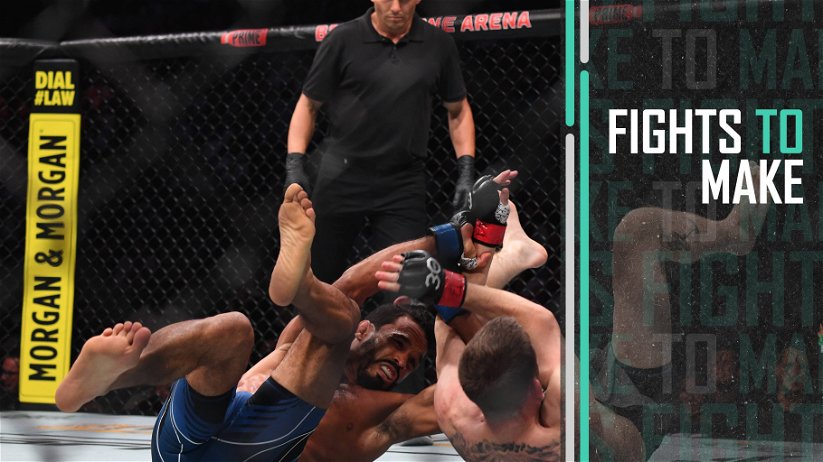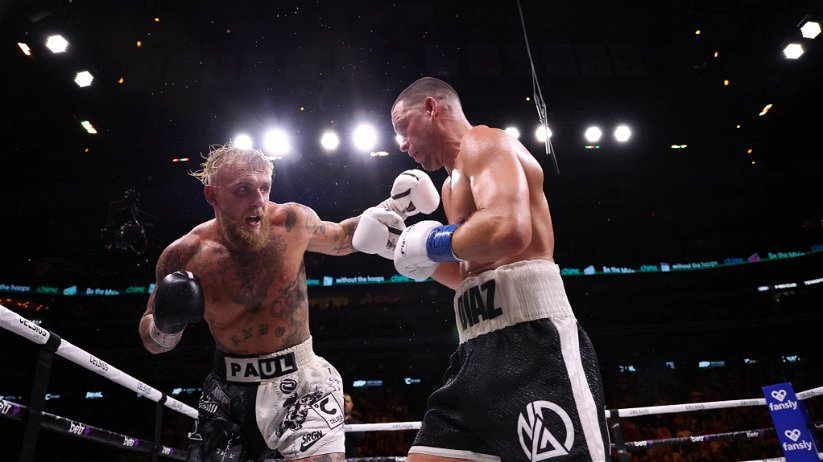Jump to
In 2013, at a “town hall” meeting” UFC president Dana White stood in front of an octagon-shaped photo of the Earth. Above that image, in all caps, were the unedited words, “World F—king Domination.” White and the UFC might not have reached that lofty goal, but the UFC sold for more than $4 billion in 2016, and the promotion reached a lucrative deal with ESPN in 2018. The UFC’s issue in 2023 isn’t how much the organization can grow but how it can prevent stagnation.

UFC has become comfortable
There’s no doubt that the UFC has morphed into a sports and business force since that bit of hubris in 2013, but there is doubt about the future of the fight promotion. That’s not to say that it is on the brink of failure. That’s far from reality. After all, the organization reportedly generated $1.140 billion in revenue last year, which was the most revenue the promotion ever reported for one year. But there are concerns about the sports and entertainment organization becoming a content production farm and slowing subscriptions to the ESPN+ app.
Normally, UFC president Dana White would greet the criticism that UFC cards don’t offer fans the enticement to circle the date on their calendar with the brush-off that they shouldn’t tune in. White’s other go-to in these cases is to tell potential viewers that low-expectation cards often deliver the most entertainment. Meanwhile, UFC matchmaker Mick Maynard took the opportunity to address the lack of depth of UFC events in 2023 by taking a shot at this website. I wrote about the short-sightedness of that thinking here and here.
I understand the pushback from White and Maynard. No one wants to hear, “your product sucks, bro,” or a more subtle variant of the same message. That raises hackles. But once the knee-jerk, “Hey, man f–k you, you f–king f–k” is out of the way, reflection should be the next step.
I wonder if the UFC has reached that point because I’m unsure if UFC brass is capable of reflection. History tells us they might not be. History is also littered with the shells of companies that didn’t reflect and react. You can see it in the strip mall stores where the faded outline of the Blockbuster logo remains visible behind the shiny new lights of whatever business took over the lease of that building, or in the demise of the once-powerful and dominant Kodak.
UFC needs to change focus
In the early days of the UFC, the promotion focused on getting fans comfortable with its name and its president Dana White. That was a very successful approach. The three letters U.F.C. became synonymous with the sport of MMA in the minds of many, and White became, and remains, the biggest star the organization has ever produced.
However, that message is getting stale.
This is something new for the UFC
The UFC has not faced this type of pressure for a long while. Since the sale, the organization has coasted on its past accomplishments. White and company have adopted an if it’s not broken, don’t fix it approach to driving down costs while increasing profits.
As with most businesses, that works for a while, but at some point, it won’t. The product can become stale. At that point, consumers will head to the product not out of excitement but almost out of obligation. The next step after that is that consumers stop purchasing that product. One can argue that the UFC is close to reaching that point.
Where’s the new thing?
The UFC Apex was not designed to be what it has become. When it opened in 2019, White said of the building, “This facility gives us the flexibility to try new things and push the envelope on producing and distributing combat sports all over the world. We are limited only by my imagination. When you think of where we started and where we are now, it’s pretty incredible, but we haven’t even scratched the surface of how big this will become.”
The UFC touted the Apex as a space that could “accommodate a variety of live events, including other sports competitions, concerts, stage shows, esports tournaments, and more. The arena can also be converted into a sound stage for use as a rehearsal space.”
However, the UFC was able to use the opening of the Apex to present events throughout the COVID-19 pandemic, and the location has become an arena where it can produce events for ESPN without the costs associated with traveling. In short, the Apex has become a way for the UFC to provide ESPN with content at a minimal cost. That’s an enormous win for the UFC and its bottom line. That huge win in business does nothing for the UFC consumer though.
UFC Fight Pass has also become an afterthought, especially since the ESPN deal. What once felt like a site where the UFC would produce innovative and exciting content has become a place where smaller promotions can broadcast their fight cards. The most recent fresh content the UFC has made for the site, outside of repacking highlights and fights, is the Fightlore series, which debuted in 2020.
The UFC must try new things if it wants to continue to thrive.
What can the UFC do?
One quick fix would be to change up or at least refocus the UFC commentary team. There are points, especially when Daniel Cormier works alongside Joe Rogan, that the table seems more focused on entertaining themselves than informing the viewers. That lack of discipline hurts the broadcast. It can be off-putting to older fans, and it does little to educate newer viewers.
I understand boredom can kick in working long events, leading to a lack of focus. One remedy would be having a prelim team and a main card team.
The UFC broadcasts are rote in 2023. We know what we’re going to get. While that may make things easy to produce for the UFC and drive down costs, it hurts the fans. The promotion could create more technical-breakdown pieces for big fights or broadcast a primer on the fighter’s tendencies and what to look for in a specific matchup.
Another potential upgrade would be to break the mold on how the fighters and camps are interviewed during the lead up. The producers could change up the locations, the questions, and the focus of those interviews. One idea would be to explore the person more than the fighter. How many times can viewers sit and watch a fighter pack their bag for a trip to the fight location or get a haircut before the event?
The big change
Of course, the most significant change would be for the UFC to stop promoting the brand and White over the fights and the fighters.
I understand why the Fertitta brothers took that approach in the organization’s early days, and it worked. But that approach needs to be updated. The brand is not going away. White is the biggest star. Those are facts. New fans will not come to the UFC broadcast just because of those three letters and White. They need something else to draw them in. That something else is the fights and the fighters.
There is no UFC without the men and women who step into the octagon. I know the brass thinks of these people as a means to an end and interchangeable cogs, but that thinking needs to die. By promoting the fighters, the UFC might accidentally create a star, but so what? That’s good for everyone. And if that star costs the UFC some money and forces the promotion to up the pay for every fighter in the organization? Good. The promotion has the money to do so.
Again, the UFC is in no way in danger of going out of business. In fact, they’re thriving in that regard, as contractual deals with sponsors and broadcasters like ESPN mean they don’t rely much on PPV, fan interest and sales anymore. That doesn’t mean they don’t need to change things up or at least be willing to try though.
UFC can afford to phone it in and count up all the dollars, but is that really the smart move for the long run? Business deals are one thing, but the consumers should matter more, and UFC should really start caring about their product and the increasing complaints about its quality.
Whether or not you agree with our opinion pieces, you can guarantee that Bloody Elbow will always tell it like it is, and share our views without ever compromising or kowtowing for access. Support independent MMA opinions by subscribing to the Bloody Elbow newsletter.
Join the Bloody Elbow Substack!
Support Bloody Elbow, and get exclusive content.
About the author




